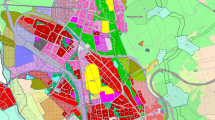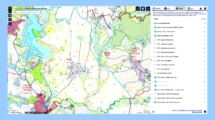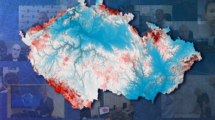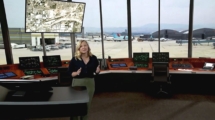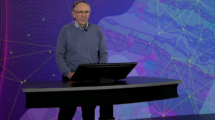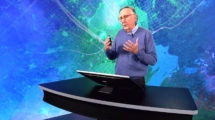Společnost Esri také letos pořádá Geodesign Summit. Firma zde představí technologické novinky a různé tipy pro práci s daty v oborech územního plánování a urbanismu.
Vstup na Geodesign Summit je zdarma, akce se bude konat ve dnech 8. až 11. února 2021. Součástí konference jsou také workshopy 8. a 11. února.
V úvodu konference vystoupí Jack Dangermond, šéf Esri. Po něm bude následovat celá řada přednášek a diskuzí, například o digitálních dvojčatech, použití jazyka R pro strojové učení v rámci ArcGIS Pro nebo o hodnocení urbanistických návrhů ve 3D.
Technické workshopy
Workshopy jsou kapacitně omezeny.
Creating and Sharing Awesome 3D Web Scenes, Jason Karian, Esri, Robin Franke, Esri
Demand for 3D visualization now reaches far beyond individual buildings to encompass entire urban areas, cities, and regions. This hands-on workshop will cover how to publish your 3D data from ArcGIS Pro and create a new Web Scene in ArcGIS Online. Web Scenes allow anyone to combine 2D and 3D datasets in order to create captivating experiences that can be used to engage the public with interactive 3D storytelling applications.
Intended Audience: This workshop is intended for those interested in a live, guided introduction to creating Web Scenes and web apps in ArcGIS Online, including planners, urban designers, and GIS professionals. Familiarity with ArcGIS Pro and ArcGIS Online is recommended.
An Introduction to ArcGIS Urban, Christine Ma, Esri, Sydney Rich, Esri
Join this hands-on workshop and seminar to learn how communities are using ArcGIS Urban to create land-use plans, update zoning, and evaluate development proposals. In this workshop, you will explore the plan authoring tools in Urban to create and evaluate multiple scenarios using metrics and performance indicators as design feedback.
Intended Audience: This workshop is intended for those interested in a live, guided introduction to ArcGIS Urban, including planners, urban designers, and GIS professionals.
Analyzing and Comparing Planning Scenarios, Britain Ogle, Esri, Eliza Gutierrez-Dewar, Esri
ArcGIS GeoPlanner helps planning and design professionals create, share, analyze, and report on design alternatives. In this training, you will use GeoPlanner to access shared datasets from ArcGIS Online to help you visualize and understand the site conditions in which a design or plan evolves. You’ll learn how to use GeoPlanner to create, evaluate, and compare multiple scenarios. Finally, you’ll learn how to identify optimal site locations and identify risks using spatial analysis and suitability modeling.
Intended Audience: This training is intended for anyone interested in using GIS for planning and design activities, including analysis, visualization, and scenario evaluation.
ArcGIS CityEngine for Urban Design, Eric Wittner, Esri, Renia Kagkou, Esri
This hands-on workshop introduces ArcGIS CityEngine software at an intermediate level, from existing city creation to the planning, redesign, and evaluation of design alternatives using the latest 3D parametric design rules. CityEngine can simulate the impact of design decisions in real time, enabling decision-makers to meet or exceed project goals, whether they be sustainability metrics, regulatory compliance, or cost reduction. Various project examples will showcase the urban planning and design capabilities.
Intended Audience: This instructor-led, hands-on training session is intended for anyone interested in 3D urban design. Familiarity with CityEngine is recommended.
Program prvního dne konference
Geodesign In The Age of Digital Twins, Dominik Tarolli, Esri
Our world is transforming, and digital twins are becoming increasingly necessary to connect the data models and technologies across Geodesign’s many disciplines.
Building Conservation Resiliency with Geodesign, Eliza Gutierrez-Dewar, Esri
The increasing strain on our world’s natural resources has pushed our fragile ecosystems to their limit.
Building Resilience for the Next Crisis, Ryan Lanclos, Esri
Looking beyond the response to any crisis is where we have the greatest opportunity to make lasting change – to break the cycle and evolve our thinking toward a more resilient future.
Meridian Water – Sustainable and Resilient by Design, Mary-Jane Wood, Jacobs, London, UK, Shannon McElvaney, Jacobs, USA
The Meridian Water redevelopment project is a major £6bn ($7.8bn), 20-year London regeneration program led by Enfield Council, bringing 10,000 homes and 6,000 jobs to Enfield, north London.
Integrating Prediction and Performance Models into Scenario-based Resilient Community Design, Galen Newman, Texas A&M University
Globally, more than 600 million people live in coastal regions lower than 10 meters above sea level and almost 2.4 billion people live within 100 km of a coastline.
Utilizing ArcGIS Urban, Dashboards and Hub to Model, Assess and Communicate Future Land Use Change Scenarios, Jennifer Immich, City of Boulder, CO, Kalani Pahoa, City of Boulder, CO
In this presentation the Planning and GIS staff representatives from the City of Boulder review their latest regional land use planning project featuring scenario modeling of future land use changes, assessing the impacts and the visual communication possibilities.
Holistic Ecological Management – Watershed Scale Process and Practical Application, Lisa Marr, Trout Headwaters, Inc., Michael Sprague, Trout Headwaters, Inc., Shannon Tillman, Tillman Conservation
Presenters Lisa Marr and Michael Sprague of Trout Headwaters Inc (THI) will be joined by Tye River Mitigation Bank owner Shannon Tillman to talk about creating a successful environmental opportunity and lasting ecological improvement for headwater streams in central Virginia’s Blue Ridge Mountains.
Predict Urban Growth Patterns Using Machine Learning with ArcGIS Pro and R, Carsten Lange, Cal Poly Pomona
The presentation showcases findings from a collaboration between GIS professionals and data scientists to apply machine learning algorithms to predict urban development.
Evaluating Development Proposals with 3D GIS, Devin Lavigne, Houseal Lavigne Associates, Marc Francescangeli, PureWeb
Downtown is the heart of Glen Ellyn and this Chicago suburb’s central business district and source of community pride.
Geodesigning Resiliency, Jean Yang, Studio-MLA, Mary-Jane Wood, Jacobs, London, UK, Michael Sprague, Trout Headwaters, Inc., Ryan Perkl, Esri, Stephen Bourne, Atkins North America
Panel Discussion
Trends, Patterns, and the Future of Planning, Petra Hurtado, American Planning Association
Over the last year, APA has developed a foresight practice that emphasizes the idea of “learning with the future” to help planners navigate change and prepare for future uncertainties. In this presentation, Petra Hurtado will present preliminary findings of APA’s foresight work, and she will explain how some of the bigger picture trend patterns and the accelerating pace of change may impact the planning profession in the future.
What about Safe and Decent Housing that is Affordable? Ned Murray, Florida International University, Nika Zyryanova, Florida International University
Access to safe, decent, and affordable housing is a fundamental element of resilient communities. A COVID-19 Community Distress Index (CDI) determined Miami-Dade County’s most vulnerable populations also live in housing structures most vulnerable to major hurricanes.
Leveraging ‘Where’, to put the ‘Why’ in GeoPI, Darin Welch, HNTB
Public engagement has long been an important piece of the project development process. The COVID-19 pandemic has elevated conversations to the forefront for the immediate need for effective virtual public engagement, and demonstrated the irreplaceable value that virtual tools have to reach new stakeholder needs and demographics.
One Menu, Many Hands to Play, Jonee Brigham, University of Minnesota, Timothy Griffin, University of Minnesota
D4CR (Design for Community Regeneration) uses a geodesign process for community design and regeneration initiatives in urban and rural Minnesota communities using principles of game design, back-casting, and integration with the International Geodesign Collaborative.
GeoEdu-GAMING: Design Education as GEO-Spatial Game of the Unknown, Christine Wacta, GeoEduGAMING Inc.
GeoEdu-GAMING explores the teaching of the 21 century’s generation with gamification and geodesign, it integrates into learning a playful component; an individual and collective constructivist-cognitive approach where the development of thoughts and understanding are fueled by both game and environment.
Strategic Development Frameworks for Five Provincial Capital Cities in Afghanistan: Rapid Landscape Assessments and Probabilistic Urban Expansion Scenario Modeling, Justin Kollar, Massachusetts Institute of Technology, Kai Ying Lau, Sasaki Strategies
How can we utilize and develop a spatial analysis approach to inform planning in the context of extreme uncertainty and data limitations while being flexible enough to translate to other cities in Afghanistan?
3D Meshes as Actionable Data – Integrating the Power of Automated Photogrammetry with GIS, Konrad Wenzel, Director Esri R&D Center Stuttgart
Photogrammetry enables a fully automatic extraction of a 3D surface representation from aerial images.
Program druhého dne konference
Tacare Community-Driven Conservation: Creating Space for Balancing Development and Nature by Geodesign, Lilian Pintea, the Jane Goodall Institute (JGI) USA
Data Driven Climate Action on Cape Cod, Kristy Senatori, Cape Cod Commission
The Cape Cod Commission, an organization charged with balancing environmental protection and economic progress on the iconic Massachusetts peninsula, is leading a region-wide effort to develop Cape Cod’s first-ever Climate Action Plan.
Regional Collaboration Through ArcGIS Hub Deployment, Beheshteh Makari, The Southeast Michigan Council of Governments (SEMCOG)
The Southeast Michigan Council of Governments (SEMCOG) is utilizing ArcGIS Hub capacities to collaborate with the Communities, Organizations, and stakeholders in Southeast Michigan on collecting and reporting surface conditions data that effect the maintenance needs, safety and usability of trails in the region, as well as collecting and evaluating safety features along the trails, such as signage, hazards, lighting, etc. and trail amenities data such as bike repair stations, restrooms, and seating areas which enhance the trail users‘ experience.
Enabling Sustainability Success with Regenerative Regional GIS, Christine Ma, Esri, Scott Edmondson, San Francisco Planning Dept.
This session will address the make-or-break crossroads that our sustainability practice faces, three emerging innovations that create the potential for sustainability success in time, and the programmatic implications for our GeoDesign community and practice.
Planning with People: Fostering Participation and Public Buy-In During the COVID-19 Era, Emilie Jordao, Avenue Consultants
The difference between a good plan and a great plan is buy-in. With a combined population of 40,000 people, Cedar City and Enoch are small rural towns in southern Utah experiencing increased growing pressure.
Using City Simulator to Prepare for COVID-19, Stephen Bourne, Atkins North America
To help communities understand how climate change will impact them, Atkins developed the City Simulator tool. This agent-based tool creates a digital twin of a city and then evolves it from present day to mid-century as it both grows in economy and population and is hit with disasters that are influenced by climate change.
Preliminary Anticipatory Recovery Impact Assessments, Joshua Barnes, Office of Continuous Operations and Risk Management – U.S. Small Business Administration, Scott Kaiser, J&M Global Solutions
During natural disasters emergency managers and local officials are required to make life and death decisions based on information that is often inconsistent, anecdotal, and haphazardly collected.
A Geospatial Approach to Quantifying Ecosystem Performance in Urban Design, Ian McRae, Sherwood Design Engineers, Josiah Cain, Sherwood Design Engineers, Wetherbee Dorshow, Earth Analytic
Design is driving engineering to a biophilic approach and engineering is driving design to high performance metrics, the nexus creates a dynamic and ecologically rich fabric that indicates there has to be an integration of technologies in order to provide rigorously engineered ecosystem services.
Assessing Flood Impacts Using a Multi-Scale Geodatabase for Newcastle (UK), Kristina Wolf, Newcastle University
In support of the United Nations Sustainable Development Goal 11 to make cities inclusive, safe, resilient and sustainable, this project develops a geospatial flood database model to assess the impact of floods on the environment, society and infrastructure in Newcastle upon Tyne (UK).
Creating Coastal Resilience – A 360 Degree GeoDesign Approach, Daniel Boudreau, GZA GeoEnvironmental, Inc.
The Town of Old Saybrook is a coastal Connecticut community located on Long Island Sound at the confluence of the Connecticut River.
Geodesign Stakeholders, Emilie Jordao, Avenue Consultants, Darin Welch, HNTB, Devin Lavigne, Houseal Lavigne Associates, Ryan Perkl, Esri, Timothy Griffin, University of Minnesota
Panel Discussion
Leveraging GeoBIM for Smarter Health and Safety in Construction, George Floros, Skanska UK, Anita Soni, Skanska UK
Construction (Design and Management) (CDM) Regulations are requirements that govern the way construction projects are planned in the UK; they are the main set of regulations for managing the health, safety and welfare of construction projects across their lifecycle.
Using GeoDesign to Promote Green Infrastructure for Stormwater Management in Green Bay, Wisconsin, David Hart, Wisconsin Sea Grant, Kayla Wandsnider, Wisconsin Sea Grant
Green Bay is a large freshwater estuary on the northwest side of Lake Michigan. The city of Green Bay, Wisconsin is located at the mouth of the Fox River, where it flows into the southern tip of Green Bay.
The Upper Los Angeles River and Tributaries: A framework for multidisciplinary, equitable collaboration, Jean Yang, Studio-MLA
The Upper Los Angeles River and Tributaries (ULART) Revitalization Plan covers the Upper Los Angeles River and Tributaries with a focus on the Aliso Canyon Wash, Pacoima Wash, Tujunga Wash, Burbank Western Channel, Verdugo Wash, and Arroyo Seco.
Pokonferenční workshopy
An Introduction to ArcGIS Hub, Brenda Wolfe, Esri, Morgan Sapia, Esri
Join this hands-on workshop to learn how communities are using ArcGIS Hub to engage communities, promote transparency, and collaborate across departments. In this workshop you will explore the tools in ArcGIS Hub to customize initiatives, embed applications, and promote your organizations goals.
Intended Audience: This workshop is intended for those interested in a guided introduction to ArcGIS Hub including information officers, planners, and GIS professionals
Analyzing and Comparing Planning Scenarios, Britain Ogle, Esri, Eliza Gutierrez-Dewar, Esri
ArcGIS GeoPlanner helps planning and design professionals create, share, analyze, and report on design alternatives. In this training, you will use GeoPlanner to access shared datasets from ArcGIS Online to help you visualize and understand the site conditions in which a design or plan evolves. You’ll learn how to use GeoPlanner to create, evaluate, and compare multiple scenarios. Finally, you’ll learn how to identify optimal site locations and identify risks using spatial analysis and suitability modeling.
Intended Audience: This training is intended for anyone interested in using GIS for planning and design activities, including analysis, visualization, and scenario evaluation.
Getting Real with BIM/GIS Integration, Erika Bocian, Esri, Rafael Lucero, Esri
Both BIM and GIS have unique and valuable roles in supporting the lifecycle of building and infrastructure projects. However, there is a significant need to effectively integrate those tools at the workflow level, so project participants and stakeholders can capitalize on their individual capabilities and benefits.
This hands-on workshop is focused on introducing best practices and practical workflows for integrating BIM and GIS data in an ArcGIS environment. Participants will learn to use both Autodesk Revit and ArcGIS Pro to georeference a model, understand how to integrate IFC data using the Data Interoperability extension and incorporate Civil 3D data into ArcGIS Pro. This will be followed by learning how to publish these disparate data sources into a fully interactive 3D web scene in ArcGIS Online.
Intended Audience: This instructor-led, hands-on training session is intended for anyone interested in learning about BIM/GIS integration best practices. Familiarity with ArcGIS Pro is recommended.
Sborník Geodesign Summit 2020
Z loňského ročníku konference je k dispozici video záznam všech přednášek na YouTube, případně si můžete přečíst vybrané prezentace.
| CityEngine in Urban Design and Planning | Presentation | Eric Wittner | Technical Session |
| Combat Homelessness | Presentation | Christine Ma | Technical Session |
| Conjuring the Emeral Crescent | Presentation | Dr. Leif Olson | User Session |
| Design for Community Regeneration | Presentation | Tim Griffin & Jonee Kulman Brigham | User Session |
| Drawings to Evoke Decision-Making | Storymap | Daniel Cronan & E. Jamie Trammell | User Session |
| Geodesign for Regenerative Sustainable Tourism | Presentation | Stephen Ervin & Vicente Moles & Megan Epler Wood | User Session |
| Geodesign: Beyond Maps and Software | Presentation | Helen Pickard | User Session |
| Improve Designs through GIS & BIM Integration | Presentation | David Reeves | Technical Session |
| Procedural Modeling in Active Transportation | Presentation | Leilei Duan & Ping Wang | User Session |
| The Future of Smart Cities | Presentation | Dominik Tarolli & Christine Ma | Technical Session |
| Translating the Geodesign Framework to WebGIS | Storymap | Janet Silbernagel | User Session |
| Tyndall Air Force Base | Presentation | William Chung & Eduardo Rendon | User Session |
| Using Geodesign to Prioritize Community Desires | Presentation | Lisa DuRussel & Dan Meehan | User Session |
Registrace na Geodesign Summit 2021
Na akci se můžete registrovat zdarma přímo na webu Esri.

